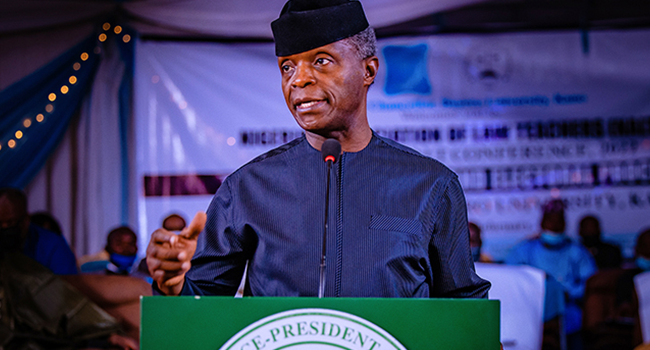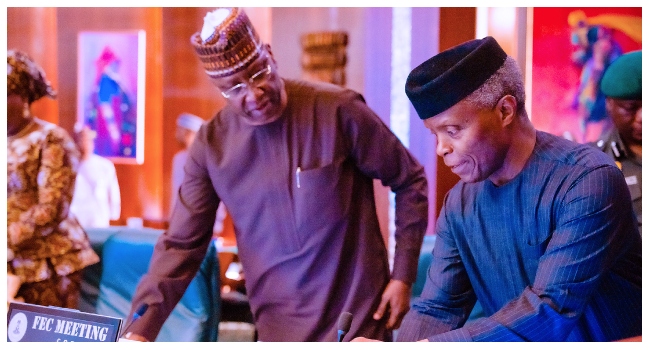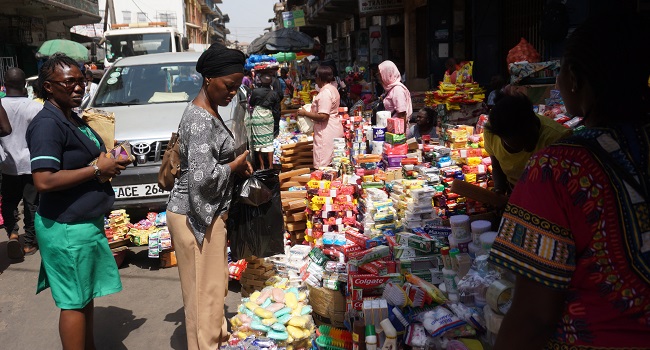
Vice President Yemi Osinbajo has called for the imposition of severe costs for delays in justice administration and delivery.
The vice-president explained that the court is a taxpayer-funded public resource and the wasting or abuse of its finite time and resources without strict consequence will eventually discredit the justice system.
According to a statement signed on Saturday by Laolu Akande, the Senior Special Assistant to the President on Media and Publicity, the Vice President said this on Friday night at the 20th year memorial anniversary symposium in honour of a legal luminary, Bankole Olumide Aluko, SAN.
The Vice President, who spoke on the issues of judicial appointments, delays in the dispensation of justice, democracy, and digitisation in the judiciary, among others, noted that “the administration of justice system is the foundation of law and order, commerce and democracy.”
He added that “Severe costs should attend adjournments. There is no greater waste of taxpayer’s funds than for a scheduled case to have to be adjourned. It is only heavy costs that will discourage this malfeasance.”
READ ALSO: Buhari Rues Youth Migration, Seeks Europe’s Partnership To Halt Trend
According to him, addressing delays should “involve imposing sanctions by a more intentional regime for the award of adverse and wasted costs.”

“Adverse costs are paid to the successful party in a civil case and wasted costs are directed against legal practitioners for poor professional standards in the conduct of a case.”
Osinbajo said “certainty or predictability of judicial outcomes is one of the major strengths of the common law.”
Regarding the impact of the law on democracy, Osinbajo said that “the democratic rights of the people and their confidence in the notion of a government of the people, by the people, for the people, suffers when the system of electoral justice fails to see itself as a handmaid of the democratic process.”
Citing the decision of the Supreme Court in the 2019 elections in Zamfara State to buttress his point, the VP noted that “to make sense, judicial decisions and reasoning must in most cases meet the common notions of fairness and justice.
“The system of justice must recognize the larger principles that it serves. In judicial interpretation, the spirit is as important as the letter of the law. Otherwise, judicial decisions become technistic applications far removed from common sense.
“The notions of justice that would meet public expectations of fairness and equity are those that promote substance over form. The observance of technicality over merit will always alienate the system of justice from the people it is meant to serve.”
On the expectations from judicial officers, Prof. Osinbajo said “while we ask for the best from our judicial officers, we must equally ensure that the conditions under which they operate are not only befitting but are good enough to attract the best of minds in our profession.”
In addition, the Vice President said the institution and infrastructure remain key to reforming the system, stating that “the judge is, of course, central to how our system of justice works. It is the court, not counsel that must determine the pace of cases.”
On the process for judicial appointments, the VP stated that the robustness and transparency of the processes in other jurisdictions “provide comfort to the candidates of the fairness of the selection process; and enable the public to have front-row seat in some of these processes”, arguing that such a process be replicated in Nigeria.
He, however, assured that the challenges affecting the administration of justice in Nigeria are being addressed, and “there is much hope for the positive reform of the system as more result-oriented work is going on and some real changes expected.”




